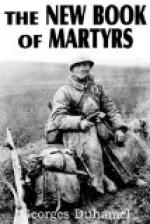If only, only it is not too late!
Again he was laid on the table. Again we cut through flesh and bones. The second leg was amputated at the thigh.
I took him in my arms to lay him on his bed, and he was so light, so light....
This time when he woke he asked no question. But I saw his hands groping to feel where his body ended.
A few days have passed since the operation. We have done all it was humanly possible to do, and Leglise comes back to life with a kind of bewilderment.
“I thought I should have died,” he said to me this morning, while I was encouraging him to eat.
He added:
“When I went down to the operation-ward, I looked well at everything, and I thought it was for the last time.”
“Look, dear boy. Everything is just the same, just as beautiful as ever.”
“Oh!” he says, going back to his memories, “I had made up my mind to die.”
To make up one’s mind to die is to take a certain resolution, in the hope of becoming quieter, calmer, and less unhappy. The man who makes up his mind to die severs a good many ties, and indeed actually dies to some extent.
With secret anxiety, I say gently, as if I were asking a question:
“It is always good to eat, to drink, to breathe, to see the light. ...”
He does not answer. He is dreaming. I spoke too soon. I go away, still anxious.
We have some bad moments yet, but the fever gradually abates. I have an impression that Leglise bears his pain more resolutely, like one who has given all he had to give, and fears nothing further.
When I have finished the dressing, I turned him over on his side, to ease his sore back. He smiled for the first time this morning, saying:
“I have already gained something by getting rid of my legs. I can lie on my side now.”
But he cannot balance himself well; he is afraid of falling.
Think of him, and you will be afraid with him and for him.
Sometimes he goes to sleep in broad daylight and dozes for a few minutes. He has shrunk to the size of a child. I lay a piece of gauze over his face, as one does to a child, to keep the flies off. I bring him a little bottle of Eau de Cologne and a fan, they help him to bear the final assaults of the fever.
He begins to smoke again. We smoke together on the terrace, where I have had his bed brought. I show him the garden and say: “In a few days, I will carry you down into the garden.”
He is anxious about his neighbours, asks their names, and inquires about their wounds. For each one he has a compassionate word that comes from the depths of his being. He says to me:
“I hear that little Camus is dead. Poor Camus!”
His eyes fill with tears. I was almost glad to see them. He had not cried for so long. He adds:
“Excuse me, I used to see Camus sometimes. It’s so sad.”




